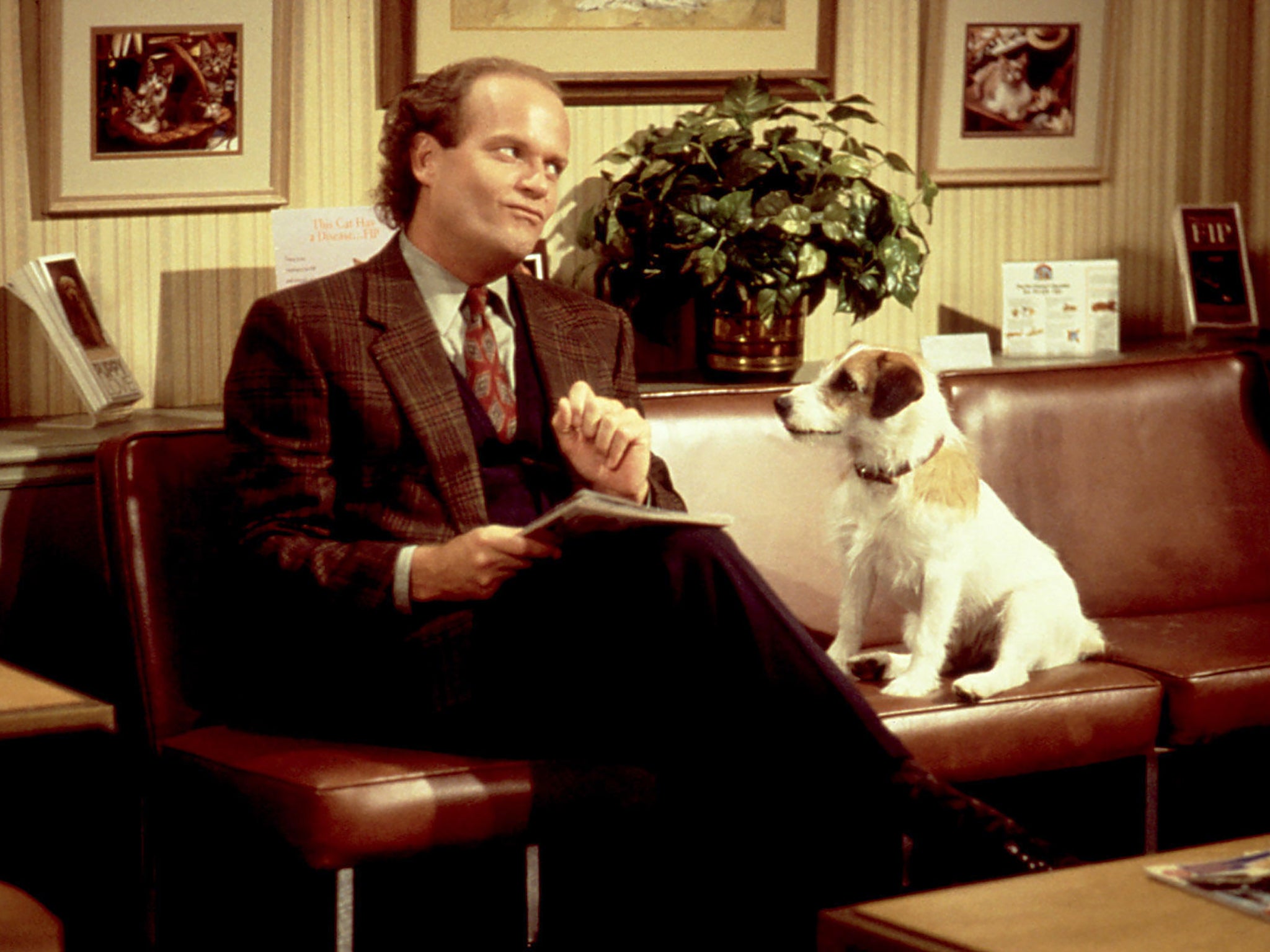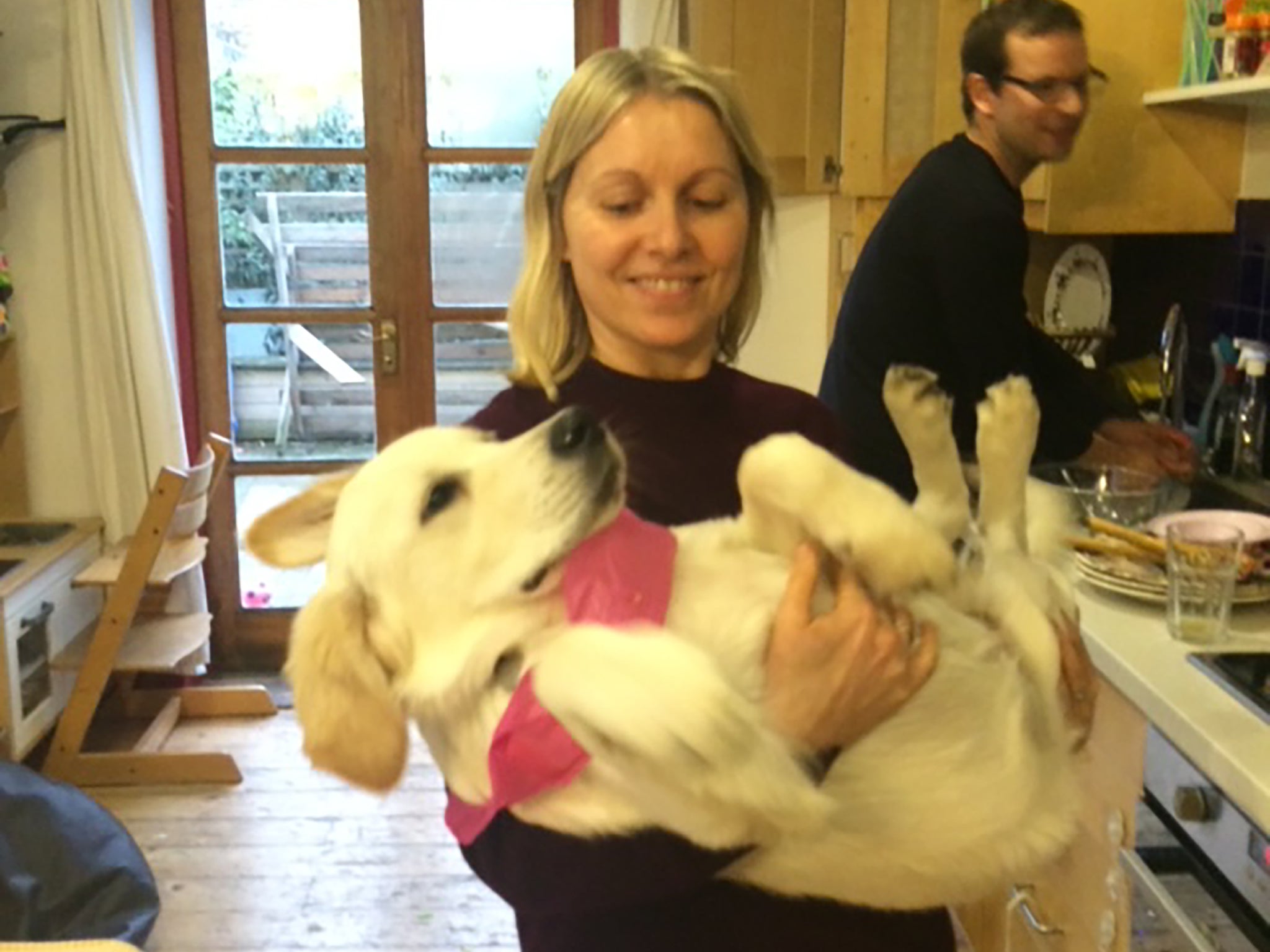Can a pet therapist cure my dog’s eating disorder?
Driven to distraction by her eight-year-old Golden Retriever, Charlotte Cripps turned to pet psychoanalysis for help. But a session with behavioural therapist and TV star Victoria Stilwell proved far more complex and emotional than she – or her dog – could have predicted


I never thought I’d be having therapy with my dog. Muggles and I are sitting in front of my laptop screen on Zoom, waiting for our consultation with a top dog behavioural therapist and TV star. But my gigantic, eight-year-old, white-haired golden retriever isn’t playing ball. Psychoanalysis is clearly not for him, as he’s walked off. I’m now sliding him along the soft wood floor by his front legs, eager for him to get the help he so badly needs.
Golden retrievers are known to love food, but what’s going on with Muggles is off the scale. He’s ripping open rubbish bags. He can shimmy open the kitchen bin with his paw. He’s a pro at getting into his bulk-sized bag of diet dog food headfirst if I forget to zip it shut. If I leave the fridge open for just a split second, he’ll manage to jump into it. Whenever my kids eat fish fingers, I have to tie Muggles to a sofa leg. He wouldn’t hurt a fly, but this situation is still exhausting.
Things hit rock bottom when Muggles legged it out of a local park and across a busy main road while we were out for a walk – all to get his mitts on a loaf of bread he’d spotted on a pavement earlier. Enough was enough. “This dog needs therapy,” I thought. I was half joking – I wasn’t even sure what that would involve. I imagined Muggles sprawled out on a chaise longue, unloading his complex issues to a shrink in horn-rimmed glasses while I waited outside in the car. But then I thought a bit more about it. Yes, it sounded eccentric, but I was also out of options. If humans can go to a psychiatrist for help, why can’t our four-legged friends. Then I remembered Victoria Stilwell, who I’d seen on the Channel 4 series It’s Me or the Dog. Born in the UK but based in Atlanta, Georgia, she’s become a star on both sides of the Atlantic with TV shows in which she helps out-of-control canines and their stressed owners. Maybe she could have the answers I’d been looking for?
Stilwell’s dog-training school, the Victoria Stilwell Academy, offers help in-person and online. An initial video consultation costs about £85, while in-person private training costs £75 to £150 in the UK depending on how far the trainer has to travel. She aims to give dog owners the tools to deal with a problem within two sessions. More tricky cases – like separation anxiety or aggression issues – might take up to six sessions.
When Stilwell appears on screen over Zoom, so poised and English that it’s as if she’s been plucked off the pages of The Famous Five books, she’s cooing over Muggles’s forlorn brown eyes. “He’s so beautiful,” she says. I sense she’s fallen in love with him. Little does she know what a nightmare he is to live with. Muggles is a pedigree dog, but he looks like he’s been pulled through a bush backwards because he spends his life in undergrowth eating half-eaten takeaways. But grooming isn’t at the top of my priority list – I’m a working single mum with two kids under six, after all.
I tell Stilwell about my dog’s fixation on food, and the big question I’ve been pondering for months: has Muggles got an eating disorder? Before our Zoom, Stilwell had asked me to get Muggles checked out before our consultation to rule out any medical issues that might contribute to his insatiable hunger. I took him to my local branch of Village Vet for a physical examination, but there were no red flags. Blood tests helped rule out diabetes and Cushing’s disease, both of which can cause hunger issues, but did reveal something else: it turns out Muggles has hypothyroidism, or an underactive thyroid. That, the vet said, could explain the increased appetite in Muggles. It was also a diagnosis that took me aback: I’d just been diagnosed with the exact same medical issue. And it’s very rare to find it in dogs. Muggles and I will even be on the same medication, levothyroxine. They say dogs often look like their owners – the canine mini-me is a narcissistic tendency – and Muggles does have the same blond locks and eye colour as me, but surely this is a step too far? The vet puts it down to “a very weird coincidence”. At least we can mutually support each other. And while I’m sure it’s not advised, we can share our meds if either one of us runs out.
Trauma is never erased. A puppy’s brain is like a sponge until 16 weeks old
Muggles’s vet tells me that his symptoms will improve if we can get his thyroid under control. But it doesn’t fully resolve the habitual behaviour. I’m a great believer in a holistic approach to wellbeing – as is Stilwell. Over Zoom, she listens carefully to my case history while Muggles lies with his feet in the air, waiting for a tummy rub. When Stilwell talks, she alternates between speaking to me and then Muggles in babyish tones – or the same way you might communicate to small children. “Firstly,” Stilwell tells me lovingly, “damn clever dog! Not acceptable in our society, I’m afraid. I’m sorry, dog. But damn clever scavenger – love it.” She seems very impressed by him. “If Muggles, God forbid, ever found himself without a home on the streets, he would survive because he’s an exceptional problem solver.”
Stilwell – who next month will star in the Channel 4 dog-training series The Dog Academy – takes a touchy-feely approach to dog behavioural therapy. It’s worlds away from the days of Barbara Woodhouse, who believed dogs needed corrective and punitive training – a trend Stilwell is trying to stamp out. It seems to work – Stilwell appears to figure out Muggles’s problem at the speed of light. “Muggles,” she says, as if she’s dived into the deepest recesses of his mind, “is getting a hit of dopamine from seeking food. That’s what’s so addictive.” She says that once Muggles gobbles up food rapidly, he gets “a hit of oxytocin”, otherwise known as the “love hormone”. “It’s a vicious cycle,” she continues. “The dopamine high is so good that he’s got to do it again and again.”

So my dog is an addict. I’m gobsmacked. Not only do we both have underactive thyroids, but also the demon of addiction – I’ve been in recovery for 27 years. We have more in common than I could ever have imagined. Stilwell asks me if there could have been an incident in mine and Muggles’s past that could have been a catalyst for his problems. Soon I’m opening up about my own history, and specifically my partner’s death in 2014, when he took his own life three days after we got Muggles.
Stilwell suggests that this early trauma – when Muggles was just three months old and alone in the house when my partner died – is the trigger for much of his adult problems. Not only that, but when I then had children in 2016 and 2018 – via IVF using my late partner’s frozen sperm – Muggles’s nose was put out of joint.
“Trauma is never erased,” says Stilwell. “A puppy’s brain is like a sponge until 16 weeks old.” He used to be my living teddy bear when I was grieving my partner’s death – I’d carry him around in a bag. “You both experienced something together and so that’s why there is this very close bond. You became everything to him too.”
She also correctly deduces that Muggles’s food compulsion got worse after my children were born. “He might actually have to comfort eat to deal with that divided love,” she says.

Thankfully, there are solutions. Stilwell suggests that I get Muggles a slow-feeding bowl, which is designed to prevent an animal from guzzling down their food. But she also advises “giving Muggles what he wants”, recommending that I hide his food “in a controlled way” around the home and allowing him to fulfil his desire to forage for it. I need to jazz up his kibble food, too, adding in chicken or broccoli to make it tastier so he doesn’t stray elsewhere. And when we’re in the park, I need to teach Muggles a “fabulous recall” by using super-enticing treats such as real chicken or liver. At home, when I’m eating with my children, I must leave him behind a child gate with a “snuffle mat” – a chunky piece of fabric with places to hide kibble or treats.
I may be overstretched as it is, but one thing is for certain – I will be supporting Muggles’s recovery from an eating disorder. That’s also down to what I discovered about the two of us during our session with Stilwell. We’d always been close, but not quite like this. I suddenly see Muggles as a dog who’d experienced similar feelings of grief as me, only totally unable to articulate them fully. I see him in a new light. Next time he insists on barking at me from the garden until I give him a rice cake, I’ll have far more compassion. Hopefully, over time, he will learn to love me and the kids more than food. I can’t wait for the day I don’t see a baguette in his gnashers or his head buried in a bin.
‘The Dog Academy’ airs from 30 March on Channel 4 at 8pm. ‘It’s Me or the Dog’ is on Discovery +. www.positively.com.
Join our commenting forum
Join thought-provoking conversations, follow other Independent readers and see their replies
Comments


Bookmark popover
Removed from bookmarks